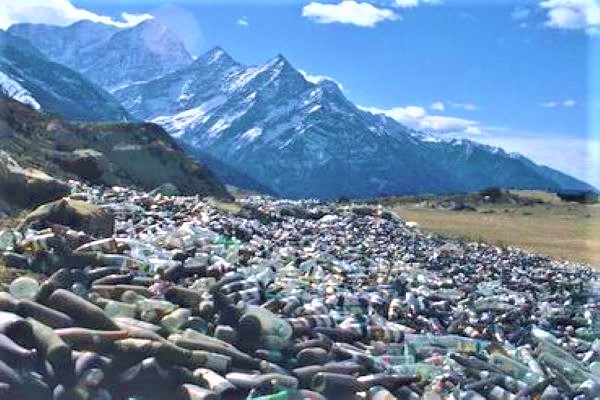Is the Himalayas turning into dumping ground? Here is a horrifying story…
Total Views |
New Delhi, September 10: India’s great freedom fighter and philosopher Mahatma Gandhi has put forward ‘seven social sins of our age’ and one of them is ‘pleasure without conscience’. ‘Careless enjoyment’ is seen everywhere in today’s modern world. Himalaya…world’s biggest mountain, world’s most attractive tourist spot, place of origin of major Indian rivers, a biodiversity hotspot…is very fast becoming the victim of such ‘careless enjoyment’ of the human being. It’s very saddening picture when we see heaps of plastic dumped on this beautiful landscape!

September 9 is every year celebrated as the ‘Himalaya Day’. Its’ a day celebrated across the State of Uttarakhand to spread the message of conservation of the Himalayan ecosystems. This initiative was started in 2010 by a group of noted environmentalists including Sunder Lal Bahuguna, Anil Joshi and Radha Behan. The Himalayas are facing major challenges such as increasing population, rampant urbanisation, unchecked deforestation, melting of glaciers and so on. In addition to all these, too much number of tourists and careless garbage throwing has added fuel to the fire in recent times. The amount of plastic and other bio-degradable waste in the Himalayas is growing at an alarming rate and wreaking havoc with this fragile ecosystem. Unfortunately, this is the ugly truth of the Himalayas.
J. C. Kuniyal, senior scientist at G. B. Pant Institute of Himalayan Environment and Development, Mohal in Kullu says, “In 2005, non-biodegradable waste was 16.9% of total waste in Manali and 34.8% in Kullu in Himachal Pradesh. In and around the Valley of Flowers and the Pindari valley in Uttarakhand, such waste comprised 84.5 and 66.4% of the total generated waste. Thus, these results show that non-biodegradable is much higher in trekking and expedition locations than the down-slope hill spots,”
Scientists have found that There are 249 glacial lakes in Himachal Pradesh and 11 have been identified as having potential risk of breaching due to waste-dumping. Glaciers are vulnerable to rising temperatures and changes in precipitation. Mass accumulation of plastic waste is resulting in a rising debris-cover on glaciers and resulting in the formation of more glacial lakes. Extreme rainfall events in the future may cause floods due to the bursting of glacial lakes, posing a threat to downstream mountain communities.
There is an environmental action and advocacy group based in Uttarakhand named Gati Foundation. This group conducted Uttarakhand’s first ever Twin City Brand Audit in Rishikesh and Haridwar. The audits revealed that more than 50 percent of the litter strewn across the hillside at major tourist spots was primarily single use plastic waste. The other two NGOs namely Integrated Mountain Initiative (IMI) and Zero Waste Himalayas, in their study have found that 97% of the total waste collected by them was plastic. Out of that, 62.67% was ‘multilayered plastic’ or polymer-based, non-recyclable food packaging. A further 17% was plastic-layered paper, such as paper cups, and plastic-polystyrene utensils. In Darjeeling and Kalimpong, nearly 70% was multilayered plastic, while other non-branded plastic made up around 12%.
As per a report by an NGO named Plastic Free Himalayas, the number of tourists have significantly increased in Nepal in the last 30 years. In 1980, there were 25000 trekkers in Nepal. From 2000 to 2012, the number of tourists in Nepal have increased from nearly 4,00,000 to 8,00,000. Researchers have also found that not only the tourists but the local community and the Defence installations are equally responsible for this menace. There are tonnes of tetrapacks and bottles and plastics going up to defence installations. But there is absolutely no mechanism to bring them back and the mountain keeps taking the loads.
Efforts are definitely being made on government and private level to get rid of this crisis. In 2009, the Himchal Pradesh Government banned the use, storage, sale and distribution of all types of polythene bags. Once again In 2011, the government imposed blanket ban on the use and storage of nonbiodegradable disposable plastic cups, plates and glasses and warned that violators would be fined with heavy amount. Uttarkhand has also imposed ban on single-use plastic. NGOs like Gati Foundation and many others are taking appreciable efforts towards waste collection and management. However, government laws and private efforts by few seem to be ineffective when large heaps of dumped plastic are still seen today.
Eventually, this is rather an attitude-generated problem which no system can solve. World-famous scientist Albert Einstein says, “you can’t solve the problem with the same mindset which has created it”. Cleaning the river in planes doesn’t make any sense when it is getting polluted at source. Coming back to Gandhiji’s statement, developing the habbit of ‘conscientious pleasure’ is the only solution!